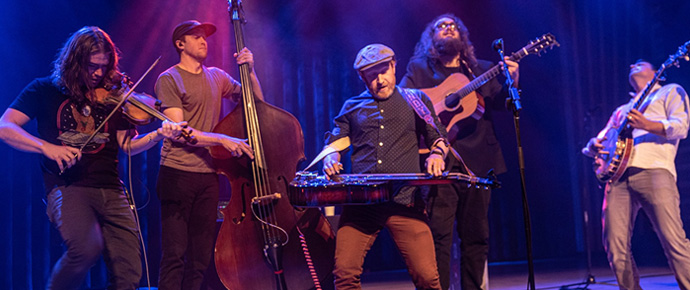
Lil Smokies in Breckenridge, CO (12/19/19) – photo by Scott Seifert
With their new album, Tornillo, it appears that the Lil Smokies have made a quantum leap forward in terms of their musical maturity, and the ability to turn their lively grassicana sound into music that can find added appeal in the mainstream. Like any number of contemporaries — Steep Canyon Rangers, Punch Brothers, Town Mountain and the like — the group found the means to pay heed to tradition, while also securing contemporary credence. Having producer/engineer Billy Reynolds at the helm — the man behind the boards for such like-minded outfits as the Avett Brothers, Band of Horses, and Midland — clearly helped in that regard, but given the sound of their two earlier albums, The Lil Smokies and Changing Shades, it’s a direction they were aiming for all along.
The band — consisting of Matt Cornette (banjo), Andy Dunnigan (vocals, dobro), Scott Parker (bass), Matt “Rev” Reieger (guitar, vocals), and Jake Simpson (fiddle, vocals) — have built a solid reputation through constant touring, as well as their frequent festival appearances at such hallowed gatherings as the Telluride Bluegrass Festival, LOCKN’, High Sierra, AmericanaFest, and Red Rocks, among the many.
Bluegrass Today took the opportunity offered by the new album’s release to talk with Andy Dunnigan about the band’s backstory as well as their perspective on their present progress.
BLUEGRASS TODAY: For starters, lets go with the back story — how did the band come together? Did the individual members know one another before the decision was made to form the band?
Andy Dunnigan: Around 10 years ago, the first configuration of the band was assembled in Missoula, MT. We met at a jam while some of us were attending the University of Montana. We were eventually kicked out of the party for playing our music into the morning, which would be a fairly common thing for the next couple of years. Today, we take our sleep and hygiene much more seriously.
Where does the band call home? What draws you to that particular place?
The band still proudly calls Montana its home, although we seem to all be scattered around the country and continent these days when we’re not traveling. There aren’t a lot of Montana bands out there beating the pavement; I definitely feel the state rooting us on from a distance, and we’re honored to represent it as sonic diplomats. We just finished a New Years run in Montana that has become a really special tradition—ending the year with a homecoming celebration and showing friends and family what we’ve been up to for the last 365 days.
Who came up with the name and what’s the meaning behind it?
For our first ever official — as in paid — gig we were welcomed to our green room with nothing but a twelve pack of beer, toothpicks, and a silver tray of Lil’ Smokies sausages. We devoured them. Being that it was our first gig, we were also nameless, and when asked after our set what our band name was, we gazed to that empty tray of toothpicks and had our answer.
Please share a little of your trajectory. How would you describe your progress from the first album to the current effort? What sort of changes or transitions have taken place in terms of the music and the inspiration?
For a long time, we were really focused on writing instrumental music. We were very inspired by Strength in Numbers and David Grisman’s Dawg music. Half of the music on our first album is instrumental.
I think the ostensible evolution of the band is in the songs, and the catering to the songwriting process itself. For musicians, I think a metric for the passage of time is in the space between the notes. Listening to what the song needs instead of what you may need comes as you grow. There are a few songs on Tornillo that don’t have a solo… it’s fantastic because the song didn’t need it.
Tell us specifically what went into the making of that new album? What was the goal, and how did it translate into the finished effort?
We really came together for this record and became more unified than we ever have before. Our intentions were to stay open-minded and really cater to the songs by adhering to each individually.
Rendering ourselves with an abundance of time in the studio to experiment with different sounds and exploration was also intentional, and it proved to be the most important pillar in the whole recording process.
Does everyone contribute equally to the songwriting process?
In our band, the songwriter will come to the group with a song that’s got a strong foundation — chords, melody, lyrics, and sometimes even a hook line. Where that goes is really up to the band in the workshopping and arranging process.
The album is named for the place where you recorded the album. So how did you choose Tornillo as the locale?
We really wanted an immersive experience, and to be distraction-free in the middle of nowhere. The desert and Texas were both very foreign to this band, but also incredibly appealing for the setting of the recording. We basically wanted to get out of our element, and eat, sleep and breath the music. It worked well.
The band still retains its bluegrass roots, but like so many of the so-called nu-grass or grassicana outfits these days, there’s a decided emphasis on melodies and songs. So how do you keep the balance between classic and contemporary without alienating the purists, and still attracting younger listeners to the fold?
We’re just trying to be as authentic as we can possibly be; that’s the ultimate goal for this band. When I’m writing, or we’re all arranging these songs, the less we are thinking about who is listening or who we are possibly upsetting, the better the music will turn out. Analysis paralysis is real and should be avoided at all cost in the songwriting process. People need authenticity more than ever as they try to navigate the contrived plastic seas of modern living today. It’s our duty.
You do a lot of festivals, so how does the festival experience affect what the band is about? Do you feed off that populist appeal?
Every festival is a family reunion…not only for the people who are watching you, but for all the performers. After we play, we get to catch up with our buddies who are just rolling into the fest, or band buds who are taking off. Festivals are where we met, where we first became inspired, and where we caught the bug. They’re everything to this band.
Speaking of other bands, do you consider yourself part of a new bluegrass brotherhood or a new movement of some sort that’s finding that fine line between the classic and the contemporary?
I definitely would consider ourselves seated around the table; it’s almost like a think tank at this point. There are so many incredible bands out there doing a new maneuver on an old dance so to speak. I think we are really finally seeing the acceptance of growth and evolution within the bluegrass community. It’s time. We feel very lucky to be riding the crest of the wave with so many heroes who are buddies now, and so much up-and-coming talent. If you’re not excited, you’re wholly not paying attention.
Are you living the dream life? Being on the road, making music with your pals, having an adoring fanbase — are you satisfied with what you’ve achieved so far and what you’ve reaped as a result?
I think you can get caught up in the numbers and the progression really easily, and miss out on the joys of the journey as a whole. There’s always a bigger room and bigger album and a better song. I’m trying to stay present in the moment and remind myself that I am living the dream. It’s the adventure that I always wanted. It’s an insane sacrifice being away from home so often, but I’m so grateful to get to make music with my best friends for a living, and travel around the country while listening and watching fans sing along and being ostensibly touched by the music. It sounds like science fiction to me.







